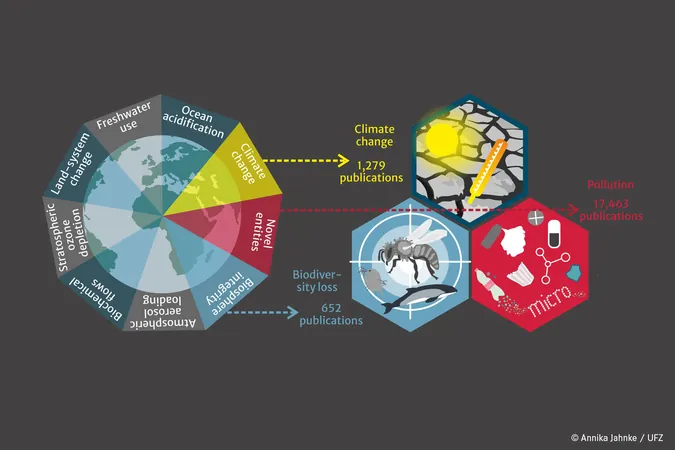
Plastics: The Silent Killer of Our Planet's Future? Unraveling the Links to Climate Change and Biodiversity Loss
2024-11-21
Author: Mei
Introduction
Recent studies reveal a startling link between plastics and the so-called "triple planetary crisis" of climate change, biodiversity loss, and environmental pollution. While much is known about how plastics pollute our surroundings, their impact on climate systems and diverse ecosystems remains shrouded in uncertainty.
Study Insights
In a comprehensive study published in the journal *Environment International*, a multidisciplinary team from the Helmholtz Centre for Environmental Research (UFZ) has dissected the far-reaching impacts of plastics on climate change, biodiversity, and environmental pollution. Their findings highlight an alarming need for global regulations that embrace the multifaceted nature of these issues, especially as the UN prepares to negotiate the Global Plastics Treaty in Busan, South Korea, from November 25 to December 1.
The Triple Planetary Crisis
The United Nations refers to the interconnected crises of climate change, biodiversity loss, and environmental pollution as the "triple planetary crisis," emphasizing how these challenges overlap and influence each other, ultimately threatening ecosystems, human societies, and economies. Yet, while the damage done by plastics in terms of pollution is widely understood, their effects on climate and biodiversity are less examined.
Research Findings
Dr. Christian Schmidt, a hydrogeologist at UFZ, noted, “Our understanding of how these crises interact with plastic pollution is inconsistent and fragmented.” The UFZ team evaluated over 19,000 scientific studies to map out the effects of plastics. They found that a staggering 17,463 studies focused on environmental pollution caused by plastics, while only 1,279 touched on climate change, and a mere 652 examined impacts on biodiversity.
Plastic Production and Mismanagement
The researchers highlighted the extensive knowledge available on environmental pollution associated with plastics, particularly considering the life cycle of these materials. Since the 1950s, about 9.2 billion tons of plastics have been produced globally. Of these, roughly 2.9 billion tons are currently in use, with 5.3 billion tons accumulating in landfills, and 1 billion tons incinerated.
What’s concerning is that between 1.75 to 2.5 billion tons of plastic are classified as “mismanaged,” meaning they can escape into the environment unintentionally. These plastics and the toxic chemicals they release pose significant threats to human health and ecosystems, prompting urgent calls for improved regulations.
Research Gaps
Yet, gaps in research remain glaring. Vital questions persist regarding how plastics are transported through wind and water, their accumulation in different environmental niches, and their interactions with factors like UV radiation and temperature changes. Additionally, the impact of plastics on the atmosphere and the cryosphere—regions where water is present as ice—has been under-researched.
Studies on nanoplastics—which are smaller than microplastics—are notably scarce, even though their potential dangers could be significant. While microplastics have received a fair amount of scrutiny due to their higher prevalence, nanoplastics are often overlooked.
Chemical Complexity
The complexity of plastics goes beyond their physical presence, as they incorporate about 16,000 different chemicals, with over 4,200 known to be persistent and harmful in the environment. Despite this, existing regulations address only a fraction of these substances.
Call for Global Action
Due to the extensive implications of plastic pollution on climate and biodiversity, UFZ researchers urge a unified global approach. They plan to deliver recommendations to shape the UN's plastics treaty discussions, advocating for comprehensive solutions that address not only waste management but also the entire life cycle of plastics from production to disposal.
Conclusion
Dr. Dana Kühnel, another key researcher at UFZ, emphasized that addressing these environmental challenges requires harmonizing regulations that protect both climate and biodiversity. "We need a legislative framework that regulates the full spectrum of plastic-related chemicals," she stated, as global leaders prepare to negotiate agreements aimed at significantly reducing new plastic production and hazardous chemicals associated with plastics.
As the crucial discussions in Busan approach, the call for comprehensive research into the effects of plastics on our planet has never been more urgent. If we fail to act, the plastics crisis could spiral further out of control, leaving devastating consequences for future generations.




 Brasil (PT)
Brasil (PT)
 Canada (EN)
Canada (EN)
 Chile (ES)
Chile (ES)
 España (ES)
España (ES)
 France (FR)
France (FR)
 Hong Kong (EN)
Hong Kong (EN)
 Italia (IT)
Italia (IT)
 日本 (JA)
日本 (JA)
 Magyarország (HU)
Magyarország (HU)
 Norge (NO)
Norge (NO)
 Polska (PL)
Polska (PL)
 Schweiz (DE)
Schweiz (DE)
 Singapore (EN)
Singapore (EN)
 Sverige (SV)
Sverige (SV)
 Suomi (FI)
Suomi (FI)
 Türkiye (TR)
Türkiye (TR)